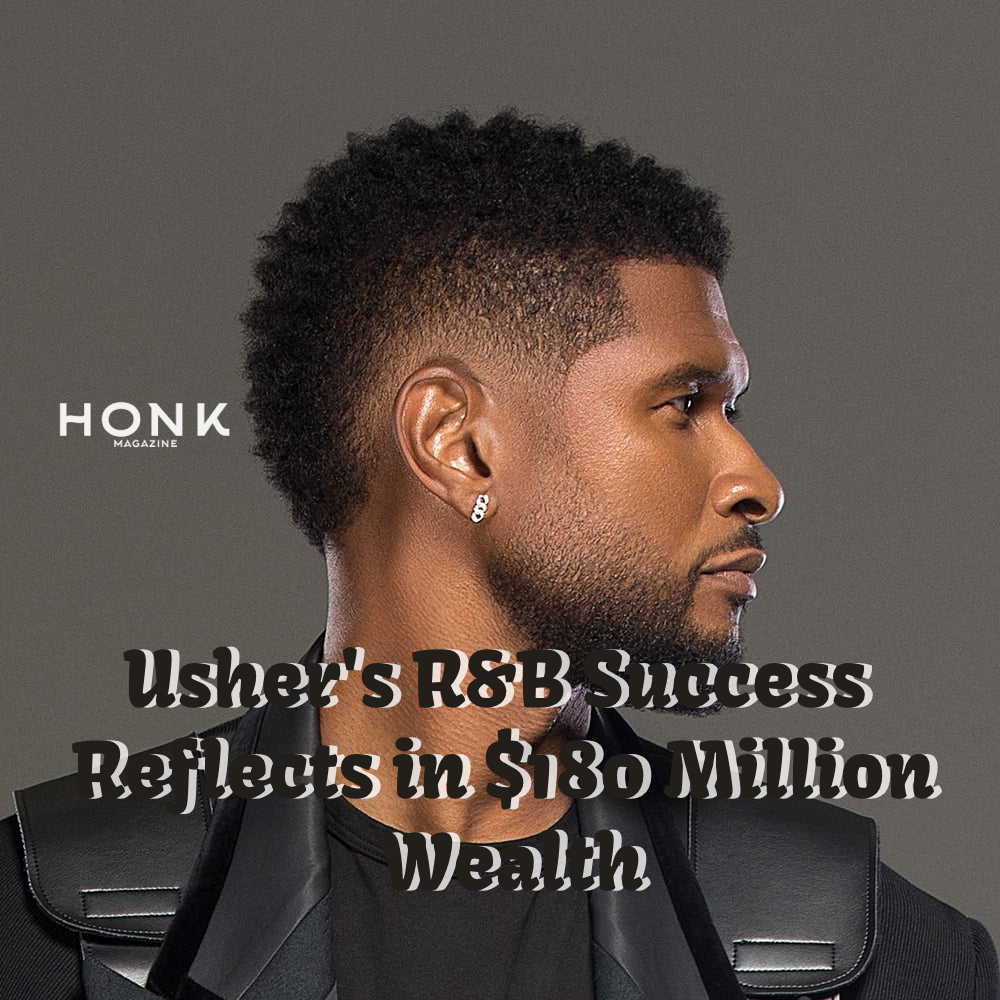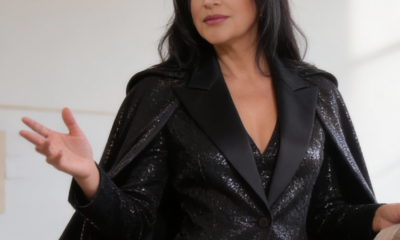Celebs
Selena Gomez On The Cover Of Interview Magazine (Spring 2020)

Selena Gomez opened up to Amy Schumer in a new profile for Interview Magazine published Monday (April 13) about reclaiming her narrative from the media, her health journey and more.

“My intention was never to become a tabloid,” the superstar told Schumer about the constant scrutiny she’s endured over her career. “So when things kind of happened that way, it got out of control. And then I was like, ‘Wait, none of this is true.’ The way the media has sometimes tried to explain things has made it sound really bad, when in reality there’s nothing wrong with the fact that I needed to go away or that I fell in love. I had to start opening up because people were taking away my narrative, and it was killing me. I’m so young and I’m going to keep changing, and no one has the right to tell me how my life’s going.”
Read more: JayHonest Cover Honk Magazine issue 2020 Edition
During the chat, Gomez reflected on using her celebrity to speak out about mental and physical health. “I’ve gone through a lot of medical issues, and I know that I can reach people who are going through similarly scary things — an organ transplant, or being on dialysis, or going away for treatment,” she said. “A huge part of why I have a platform is to help people. That’s why I think I’m okay with the magnitude. I mean, I’m not really okay with it — but I’m going to say that I am because it’s worth it. I know that I’m making someone somewhere feel good, or feel understood or heard, and that’s worth it for me.”
The superstar also opened up about the process of creating her latest album, Rare, starting with lead single — and Gomez’s first No. 1 hit on the Hot 100 — “Lose You To Love Me.”
“I wrote it at the beginning of last year, and had just gotten out of treatment,” she revealed. “It was a moment when I came back and I was like, ‘I’m ready to go into the studio with people I trust and start working on songs.’ There was an air around it where people were very happy, because it was like I was going to finally be me. But I didn’t necessarily see it that way at the time. When I wrote the song, I was basically saying that I needed to hit rock-bottom to understand that there was this huge veil over my face.”
Check out Gomez’s Interview Magazine cover below.

Artist Spotlight
Ed Sheeran’s Wealth Climbs to $300 Million

Ed Sheeran is one of the most famous musicians of our time, and his net worth has now reached an impressive $300 million. This achievement puts him among the richest artists, especially in the UK. Ed’s rise to fame is a story of talent, hard work, and smart financial choices.
1. From Humble Beginnings to Global Stardom
Ed started his career playing in small venues, but his dedication paid off when he became a superstar, performing in big stadiums worldwide. His music journey began with nonstop touring and releasing songs independently before he hit it big. His early success came from his debut album, “+” (Plus), which included popular songs like “The A Team“ and “Lego House.“ This album opened doors for him, and each of his later albums continued to break records and earn a lot of money.
2. The Power of Touring
One key to Ed Sheeran’s financial success has been his concerts. His Divide Tour, which took place from 2017 to 2019, made history by becoming the highest-grossing tour ever, with over $775 million earned. This massive tour covered many countries and attracted millions of fans, allowing him to earn money from ticket sales and merchandise. Unlike many artists who rely mostly on music sales, Ed’s ability to draw huge crowds has significantly boosted his income.
Even after the pandemic, he didn’t slow down. His recent Mathematics Tour has continued this trend, with large audiences and ticket sales ensuring his financial success remains strong.
Check out this article: YG Takes Rolling Loud LA by Storm with Hilarious Trump Takedown
3. Music Sales and Streaming
Ed Sheeran’s music is incredibly popular in physical albums and on streaming platforms like Spotify, Apple Music, and YouTube. His songs have billions of plays, and streaming has become a major way for artists to make money today. Hits like “Shape of You,” “Thinking Out Loud,“ and “Perfect“ have earned him millions in royalties, making his music one of the most listened to globally. His music videos also attract billions of views on YouTube, adding to his financial success.
4. Smart Investments and Business Moves
Beyond his music career, Ed has made wise investments that have helped increase his wealth. He owns several properties in the UK, including a large estate in Suffolk nicknamed “Sheeranville.“ Investing in real estate has proven beneficial for his finances.
Ed has also expanded into the restaurant business, investing in pubs and eateries in London. Because of these ventures, he has created multiple income sources, making him less dependent on just music sales. He also has endorsement deals with big brands, increasing his net worth.
5. Giving Back to the Community
Despite being wealthy, Ed Sheeran is known for his humble nature and generosity. He has given millions to charity, supporting causes like music education, children’s hospitals, and community projects. His success enables him to help others, showing that he is not just a talented artist but also someone who cares about making a difference.
He has funded schools, provided musical instruments for young musicians, and supported many UK-based charities. Ed has expressed his desire to use his fortune to positively impact the lives of those in need.
Check out this article: Duke Dennis Caught Off Guard by GloRilla’s Flirtatious Bar on New Remix
A Testament to His Journey
Ed Sheeran’s journey to financial success showcases the results of hard work, dedication, and exceptional talent. His ability to connect with fans worldwide has made him one of the most loved artists. With a net worth of $300 million, Ed Sheeran is a great example of how talent and smart choices can lead to extraordinary achievements. He continues to release new music, ensuring his place in the industry remains strong and bright.
Celebrity
Usher’s R&B Success Reflects in $180 Million Wealth

Usher Raymond IV, known simply as Usher, is one of the biggest stars in R&B music. Over his 20-year career, he has transformed from a young artist into an international sensation. With a net worth of around $180 million, Usher’s story is not just about his hit songs but also about smart choices that have helped him grow his wealth in music and through various business ventures.
1. A Remarkable Music Journey
Usher’s career began in the late 1990s when music executive L.A. Reid discovered him. His first album came out in 1994, but it wasn’t until his second album, “My Way,” in 1997 that he truly gained fame with songs like “Nice & Slow” and “You Make Me Wanna.” His third album, “8701,” released in 2001, included the popular track “U Got It Bad,” which helped to establish him as a leading R&B artist.
The height of Usher’s career came with his fourth album, “Confessions,” released in 2004. This album included massive hits like “Yeah!” and “Burn,” making it one of the best-selling R&B albums ever. Usher won many awards, including Grammys and American Music Awards, thanks to his unique blend of R&B, pop, and hip-hop, which won over many fans and secured his place in music history. By selling over 75 million records worldwide, Usher ranks among the best-selling musicians of all time. His success comes not just from his album sales but also from other aspects of his career.
Check out this article: Kendrick Lamar & SZA Celebrate Five Weeks at No. 1 for “Luther” on the Hot 100
2. Success from Tours and Live Shows
Apart from selling records, Usher has earned a significant amount from his tours. One of his most famous tours, the “Confessions Tour,” made over $75 million globally. Usher’s live performances are known for his incredible dance moves and stage presence, making them a major draw for fans. These tours allow him to connect with his audience and serve as a major source of income from ticket sales and merchandise.
In 2021, he started a residency in Las Vegas, which has also been a big success and adds to his wealth. Such residencies are a popular way for top artists to earn consistent income while performing.
3. Wise Investments and Business Moves
Usher’s smart business decisions have greatly contributed to his wealth. He has invested in various areas like real estate and technology. Usher owns several luxury homes in prime locations, and as property values rise, his investments have been very profitable.
He has also explored the tech world by investing in startups, including Tidal’s music-streaming service, showing his forward-thinking approach. Additionally, Usher has ventured into fashion, working with clothing brands and starting his own line, which helps diversify his sources of income.
4. Brand Partnerships and Endorsements
Over the years, Usher has teamed up with big global companies, boosting his visibility and earnings. His partnerships with brands like Coca-Cola, Jimmy Choo, and Nike have made him a recognizable figure and brought in substantial endorsement deals. His ability to connect with a wide range of people has made him a popular choice for brands looking to reach different audiences.
Usher has also enhanced his brand through commercials, product launches, and endorsements, contributing significantly to his wealth. Overall, Usher’s story is one of talent, hard work, and smart business choices that have made him a powerhouse in the music industry and beyond.
Check out this article: Suge Knight Calls Out Kanye West Over Offensive Comments on Carter Twins
5. Philanthropy and Legacy
Usher’s wealth reflects his amazing entertainment success and dedication to giving back. He is passionate about helping others through his Usher’s New Look Foundation, which supports young people in underserved communities by providing them with educational resources, mentorship, and career opportunities. His efforts show that he wants to make a lasting positive impact on society and improve the lives of those around him.
Usher’s incredible journey from a hopeful young artist to a global superstar with a net worth of $180 million showcases his undeniable talent, hard work, and smart choices. His wealth comes not just from his music career but also from his various business ventures, investments, and collaborations. Usher’s influence spans across music, fashion, technology, and philanthropy. His legacy includes his lasting impact on popular culture. As his career grows, it’s clear that Usher will remain one of the most influential and successful figures in the entertainment world.
-

 Artist Spotlight6 days ago
Artist Spotlight6 days agoBilly Chuck Da Goat turns walking away into a bold statement in latest release “Road Jack”
-

 Artist Spotlight6 days ago
Artist Spotlight6 days agoMamas Gun and Brian Jackson shines light on the truth on latest release “DIG!”
-

 Artist Spotlight6 days ago
Artist Spotlight6 days agoBromsen crafts a suspension between attachment and release in new single “Concendrain”
-

 Artist Spotlight5 days ago
Artist Spotlight5 days agoDonna Dafi unveils a fearless pop power move on latest release “Primadonna”
-

 Artist Spotlight5 days ago
Artist Spotlight5 days agoEylsia turns inner struggle into radiance with latest release “Desert Learns to Shine”
-

 Artist Spotlight7 days ago
Artist Spotlight7 days agoPaul Hodes and The Blue Buddha Band hit the open road with soulful americana in latest release “The Heartland”
-

 Artist Spotlight6 days ago
Artist Spotlight6 days agoMonkey Meadows shifts gears through motion and memory on latest release “Red Car”
-

 Artist Spotlight6 days ago
Artist Spotlight6 days agoJohn O’Brien sparks a heartfelt journey from routine to romance on latest release “Sophie Came to Town”

